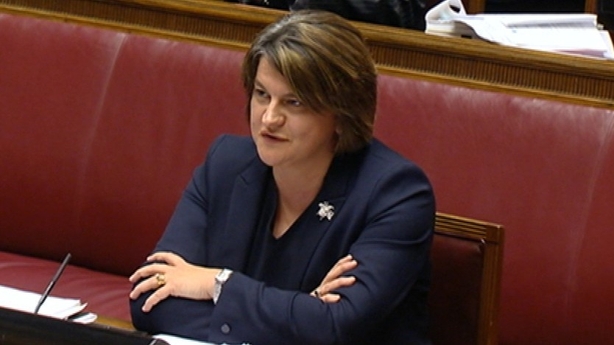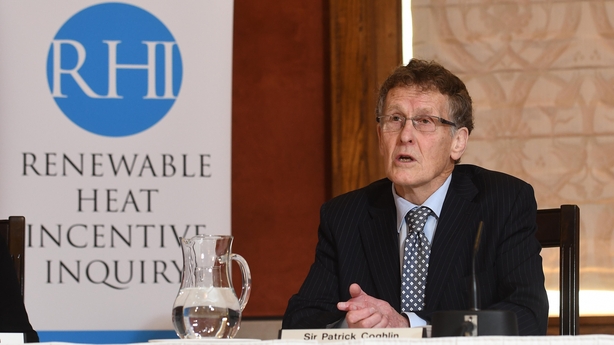A controversial green energy scheme that triggered the collapse of the Stormont Assembly was "a project too far" that never should have been adopted, an inquiry report has found.
The report says the risks involved in the Renewable Heat Incentive scheme were not sufficiently understood by those within the Northern Ireland government who should have known.
It says First Minister Arlene Foster should not have signed off on the scheme in her previous role leading the department that established it.

In her evidence to the inquiry, the DUP leader insisted she had done nothing wrong and should not be held responsible, and said she might have acted differently if she had been aware of all of the issues.
"Minister Foster should not have signed an RIA document in which she was declaring that the benefits justified the costs without being provided with or seeking all of the necessary information about the lifetime costs," the report says.
But the chairman, retired judge Patrick Coghlin, makes it clear that the blame is shared by many.
"Responsibility for what went wrong lay not just with one individual or group but with a broad range of persons and organisations involved, across a variety of areas relating to the design, approval, management and administration of the NI RHI scheme throughout its life," he says.
The scheme was aimed at encouraging people to convert to eco-friendly wood-burning heating systems.
But serious flaws in the way subsidies were paid meant claimants could make huge profits by running their stoves and boilers as much as possible.
It became known as 'cash for ash' as the more claimants burned, the more they earned.
In his report, Mr Coghlin says the flaws and problems were not the result of "corrupt or malicious activity on the part of officials, Ministers or Special Advisers".
He adds: "Rather, the vast majority of what went wrong, was due to an accumulation and compounding of errors and omissions over time and failure of attention, on the part of all those involved in their differing roles, to identify the existence, significance or implications of those errors and omissions."
Mr Coghlin also warns there is no guarantee that the weaknesses shown in governance and leadership unearthed by the inquiry could not combine again to undermine some future initiative.

He said many of the failings observed in the handling of the RHI scheme had been observed in earlier failings in other projects.
It criticises the treatment of a whistleblower, who repeatedly contacted the Department of Enterprise, Trade and Investment to point out the risk of the scheme being exploited. Her warnings were not heeded.
"The treatment of this individual and of her attempts at communicating her concerns to the Department fell well below the standard that she was entitled to expect," it says.
Mr Coghlin also criticises the lack of inter-departmental co-operation, referring to comments by Deputy First Minister Michelle O'Neill during her time as minister for agriculture and rural development.
In written evidence to the inquiry, she said it was not for her to scrutinise the work of another minister.
The report also criticises a lack of formal record-keeping of important discussions and decisions about the scheme.
It paints a picture of senior civil servants being unwilling or unable to challenge ministers on important issues, and failing to understand the complexity of the RHI scheme.
Read more:
What is the 'cash-for-ash' controversy?
The report says the problems were exacerbated by a high turnover of civil service staff, with no formal system of sharing information between those leaving and those joining the department responsible for running the scheme.
The way Sinn Féin and the DUP appointed their Special Advisers, or SpAds is strongly criticised.
Mr Coghlin says they did not follow proper procedures, and that the processes they adopted "effectively frustrated" the purpose of legislation governing the appointments.
"As a consequence, some SpAds wielded very significant power and were encouraged to see themselves as more directly responsible to the central authority or OFMDFM and their political parties, than to their individual Ministers."
The report makes 44 recommendations.
They include new codes of conduct for ministers and Special Advisers to reflect its findings.
It says ministers should be given training "on their role in relation to policy, legislation and on the working of public expenditure and value for money".
The report also recommends that the Northern Ireland Civil Service "should develop a better process to learn from past failures".
The inquiry sat for 114 days.
During that time, it heard oral evidence from 63 witnesses and took statements from 450.
It considered more than a million pages of evidence, and cost an estimated £10m.
Additional reporting: Gail Conway







